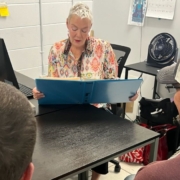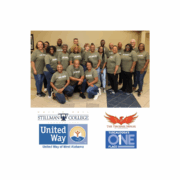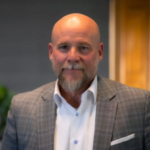‘A Whole-Person Change’: Phoenix House’s Approach To Recovery
As National Recovery Month comes to a close in September, we took a look at the Phoenix House of Tuscaloosa and its approach to treatment.
Ryan Phillips, Patch Staff
Posted Wed, Sep 27, 2023 at 2:19 pm CT
Original Article
TUSCALOOSA, AL — As National Recovery Month comes to a close in September, the Phoenix House of Tuscaloosa continues to be on the frontlines in the battle against addiction.
Tuscaloosa Patch has reported extensively on the black-and-white numbers from the Phoenix House, but what’s easy to overlook for many on the outside is the process incorporated by the nonprofit treatment center.
It’s an approach that focuses on treating addiction as a disease and one that has helped more than 10,000 get on the right track toward recovery.
Phoenix House of Tuscaloosa Executive Director Ted Sexton said the path to recovery is similar to that of someone who has suffered a stroke.
“You don’t recover from a stroke in a day,” he told Patch. “You normally don’t recover from a stroke in just a couple of months. It is a long-term rehab issue for a stroke to get back to 100% and substance abuse disorder is similar. We’re asking people to be involved in a whole-person change.”
Phoenix House Clinical Director Jon Tyler not only devotes his professional life to helping addicts but is one of the countless individuals who’ve benefited from treatment through the Phoenix House. He is also one of seven people who have gone through the treatment program and are now employed by the nonprofit.
Tyler, who has worked with the nonprofit for almost two decades, explained that the Phoenix House — a state-certified facility through the Alabama Department of Mental Health — offers a transitional level of care, with the goal of stabilizing the individual to reduce the triggers that may result in a relapse.
Of his own recovery journey, Tyler reflected on recovery meetings and those who took their own time to show him he was valued and not alone.
“It was the meetings that we were having and I saw people that were taking out of their own time to come up here and share their experience,” he said.
At present, the Phoenix House offers a 12-week program, which sets the nonprofit apart from many treatment centers that serve primarily as short-term detox facilities.
“Those kinds of facilities are generally doing the detox and trying to deal with true medical emergencies,” Tyler said. “Once the person has gone through maybe a detox or has gone through a higher level of medical care and needs to transition back into the community, that’s where we come into play.”
Tyler went on to say that most of the clients for The Phoenix House come to the nonprofit with little to no possessions or even necessary documents for gaining employment, such as identification, a social security card or a birth certificate. Most don’t even have bank accounts.
For instance, Sexton said a law enforcement agency from south Alabama recently brought a woman to The Phoenix House and dropped her off with nothing more than the jail-issued jumpsuit she was wearing.
“And they demanded their jail overalls before they left,” Sexton said. “That’s the type of thing that we see here.”
When a client first comes to The Phoenix House, Tyler said the goal is to get them to a “baseline” level of functionality. This includes making sure they have proper clothes, toiletries and food — necessities often taken for granted by most.
Tyler then said work begins to prepare the client to function in the everyday world, providing them with skills for job interviews.
“We get them prepared mentally, physically, emotionally to go into every day,” he said. “And the everyday world for most of us is the working world.”
Living arrangements are also a central component of The Phoenix House’s approach to treatment, with the nonprofit recently placing more than 180 people in independent living plans after they leave The Phoenix House.
Tyler also said experience has shown that if a client goes back out into the world without an independent living plan, the chances of success are greatly diminished.
“So they left and they left employed,” Tyler said with pride. “And so they’re ready for a more independent living program. But when they came to us before they started with us, they did not have housing or it was very temporary housing, which is friends, and family that were providing shelter or they were staying in homeless shelters … But even though we have individualized treatment plans, there is basically a process that you’re going through to reach that individualized goal.”
With respect to housing issues that can cause a relapse, Tyler said the lack of established credit is also an area of focus for clients at The Phoenix House.
“When they turn around and need to apply for an apartment or somebody runs a credit check on them, that’s disastrous,” he said. “So we’re starting early on helping them start not only to change their behavior but the associated issues they’re going to have to deal with. So many of them are coming to us without education. They have been in a position where they’re fighting for their lives or fighting for whatever else. They’re confrontational.”
An important theme in the nonprofit’s mission, Sexton said, is creating a connection to everyday society for the people they are serving.
“We’ve mentioned that 80% of them come through the courts,” Sexton explained. “Probably 95% of them have some sort of legal issue that they’re trying to figure out how to deal with. And so one of the things that, again, Jon [Tyler] does in his individualized treatment plan is take all those things into consideration and figure out how do we help you help yourself with the legal system?”
Case managers for the Phoenix House will then ask these clients certain questions like:
“How are you going to deal with this in a responsible fashion?”
“How are you going to address the judge?”
“How are you going to bring this documentation that truly shows that you are indeed meeting the expectations of the court?”
Once the initial issues are resolved and the client reaches a baseline status of stability, they will begin work with one of the numerous partner agencies or through programs offered by West AlabamaWorks! As part of the employment component, The Phoenix House offers transportation to and from work.
“Once they get a job, they start working the job during the day and then we have a whole series of programming at night,” Tyler said. “We’re trying to get them to practice the balancing act that’s going to be necessary to maintain a life in recovery. Because this is a lifelong battle.”
Tyler then stressed that having employment isn’t enough to ensure a client is on the right path to recovery, which raises the need for guidance and accountability when it comes to getting the most out of programming like 12-step meetings.
“We take them to 12-step meetings where we help them out and connect them with the local recovery community or a sponsor,” Tyler said. “We have peer groups here and our case management lines them to different services around the city, like medically assisted treatment.”
All of that work, however, can be compounded into the original mission of a “whole-person change.”
“We don’t carry them, because we’re going to walk with them,” Sexton said. “We’ll give them a hand when they come in. But it’s all about walking with them and letting them start trying to fly into the process, even at 12 weeks. That’s why that’s the goal.”
With this in mind, Sexton went on to say that the hope is to expand the capabilities of The Phoenix House to be able to offer services for two and a half to three years as opposed to the current 12-week program.
“We want to change the whole person and give them the ability to flap their wings independently and learn,” Sexton said. “And learn how to have the confidence they need to get back in the community and be a sustaining member of the community with somewhere around a 10% chance of relapse. But our mission is to change the whole person.”






